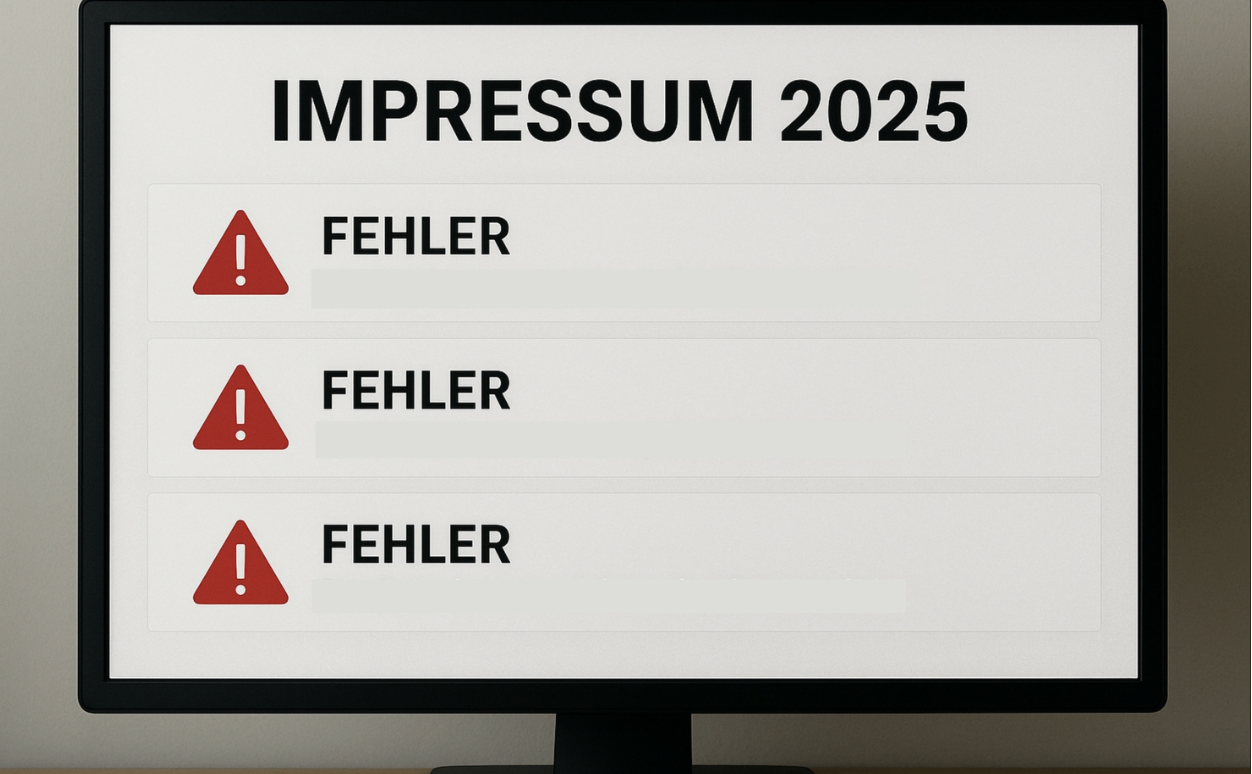The imprint seems trivial - the more it surprises me to see how many errors do happen in everyday business life. These mistakes are particularly troublesome because they may trigger cease and desist orders and considerable fines.
Some of the following errors have only occurred during the past year.
Frequent mistakes in imprints
References to outdated law
TMG vs. DDG
In May 2024 the DDG replaced the TMG. Now §§ 5, 6 DDG stipulate the obligation to have an imprint. Yet, you can still find many imprints referring to the old § 5 TMG.
Online dispute resolution vs. VSBG
Only recently on 20th of July 2025 the following notice has become outdated:
"The European Commission provides an online dispute resolution platform that you can find here: https://ec.europa.eu/consumers/odr/."
The platform was discontinued due to little use.
This should not be confused with the obligation to provide dispute resolution for consumers under the German VSBG law. The latter still applies.
RStV vs. MStV
Similarly, in 2020 § 18 II MStV replaced the old § 55 II RStV.
Special obligatory information
Some information is only required from certain telemedia.
Responsible party for blogs and press releases
According to § 18 II MStV only telemedia with editorial or journalistic content are obligated to name a representative for such content. Mainly, press releases, blogs and news qualify as such content. The representative must be a natural person.
Commercial register information
Unfortunately, in many imprints only the name of the company as well as the physical and email address are named. Companies that are registered in the commercial register however must also name the applicable local court, their HRB number and the names of their managing directors.
Professional and regulatory authorities
If you exercise a regulated profession (e.g. lawyer or bank) or are subject to a regulatory authority (e.g. legal bar or BaFin), this must be mentioned in the imprint as well.
Disclaimer
The most common unnecessary content of imprints is the disclaimer. The companies try to exclude liability for links and other content. The text refers to a ruling by the local court of Hamburg. However, having such a disclaimer can even trigger a cease and desist order, as was ironically ruled by the high court of Hamburg on 10th of December, 2012, under reference code 5 W 118/12. Consequently, a disclaimer can do more harm than good because liability cannot be effectively excluded: You are either liable by law according to the content of your website and references - or not.
Which media require an imprint? Where should you put it?
Website
It is commonly known that commercial websites require imprints.
The imprint should be accessible with at most two clicks from any other subsection of the website. The footer lends itself to host the link to the imprint.
Apps
It is less known that mobile applications also constitute telemedia and thus require an imprint. You can also put it into the footer or the main menu.
Social media profiles
Only few people know that commercial profiles in social media such as LinkedIn and YouTube must have an imprint. Even though one uses another party’s services, you do curate your own advertising content. This obligation does not apply to employees.
Depending on the profile accessibility and the offered space you may link the imprint of your website.
What consequences pose errors in imprints? Cease and desist, fines and liability
As the example of the disclaimer shows, mistakes in imprints may cause cease and desist orders.
Since the obligation to have an imprint is a public duty, you may also be fined if you don’t have a proper one. In theory, the maximum fine is 500,000 EUR, but in practice only a fraction of this will be levied, if at all.
Lastly, you may risk liability. If, for instance, you give false information regarding the legal form and the company’s representation, you risk unlimited, personal liability.
How do I create an imprint?
Of course feel free to hire me as an attorney to draft an imprint or answer specific questions, but in practice many online generators have proven handy. If you use them though, make sure to check them against the above listed mistakes.
Published on 21.11.2025
